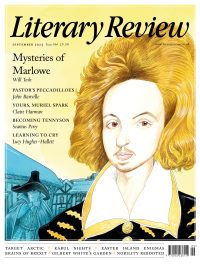Claire Harman
Fighting Words
The Letters of Muriel Spark, Volume 1: 1944-1963
By Dan Gunn
Virago 688pp £35
When Muriel Spark was editor of Poetry Review, and long before she became famous, she was keen to promote a new method of literary criticism, using charts, tables and the careful expunging of ‘personal reactions’. She hoped that this might allow a quasi-scientific ‘true critical standard’ to emerge, discourage the publication of bad poetry and regulate interpretation of the good stuff. This eccentric suggestion was typical of a woman often bent on controlling other people’s critical instincts.
In her later years, Spark said she wanted her whole archive to be available to scholars and biographers posthumously, ‘however badly [it] reflected on my personal or professional reputation’. She tried, however, to censor and suppress the work of her appointed biographer, Martin Stannard, who had been given access to it. Stannard was surprised by how much Spark’s Tuscan study resembled a business office, with its hundreds of densely packed and meticulously arranged box files. Spark compulsively hoarded ‘almost every document that passed through her hands’, according to Dan Gunn. She also kept carbon copies of her own letters and faxes. She wrote in her autobiography (a singularly unrevealing one) that she thought of this archive as ‘silent, objective evidence of truth, should I ever need it’.
Two fascinating new books, both centred on the first half of Spark’s life, show that Spark was obsessively concerned about her work and reputation. Frances Wilson’s biography Electric Spark: The Enigma of Muriel Spark (Bloomsbury 432pp £25) stops at a pivotal year, 1957, when Spark’s first novel was published. The

Sign Up to our newsletter
Receive free articles, highlights from the archive, news, details of prizes, and much more.@Lit_Review
Follow Literary Review on Twitter
Twitter Feed
The son of a notorious con man, John le Carré turned deception into an art form. Does his archive unmask the author or merely prove how well he learned to disappear?
John Phipps explores.
John Phipps - Approach & Seduction
John Phipps: Approach & Seduction - John le Carré: Tradecraft; Tradecraft: Writers on John le Carré by Federico Varese (ed)
literaryreview.co.uk
Few writers have been so eagerly mythologised as Katherine Mansfield. The short, brilliant life, the doomed love affairs, the sickly genius have together blurred the woman behind the work.
Sophie Oliver looks to Mansfield's stories for answers.
Sophie Oliver - Restless Soul
Sophie Oliver: Restless Soul - Katherine Mansfield: A Hidden Life by Gerri Kimber
literaryreview.co.uk
Literary Review is seeking an editorial intern.